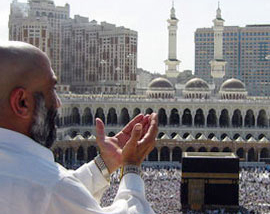 Jeddah, May 29: Haj Minister Bandar Hajjar has warned domestic Haj service operators against increasing Haj service charges, adding that companies that impose exorbitant prices would be fined up to SR100,000.
Jeddah, May 29: Haj Minister Bandar Hajjar has warned domestic Haj service operators against increasing Haj service charges, adding that companies that impose exorbitant prices would be fined up to SR100,000.
“Monitoring panels have noticed that 52 companies have hiked prices during the last Haj season,” he said, adding that their cases have been transferred to a ministerial committee for punitive action.
He said punishment would include suspension of service for one Haj season or more, in addition to fines of up to SR100,000.
The ministerial committee took 125 decisions in 2013 to punish violators, Hajjar said, adding that 51 of these decisions were suspension of services and imposition of fines.
The minister hoped the new measures taken by the ministry, including early distribution of tents at Mina and Arafat four months ahead of Haj, would contribute to reducing service charges.
Saad Al-Qurashi, a member of the National Committee for Haj & Umrah, welcomed the measures and said they would contribute to reducing charges considerably. Speaking with Arab News, he said 241 domestic Haj firms would render services to 150,000 pilgrims from within the Kingdom. The number of domestic pilgrims has been cut by 50 percent due to ongoing expansion projects.
Al-Qurashi also disclosed that as many as 41,000 pilgrims would be able to enjoy low-cost Haj services this year, paying between SR2,500 and SR5,000. “This is much less than the prices charged last year,” he said.





Comments
Add new comment